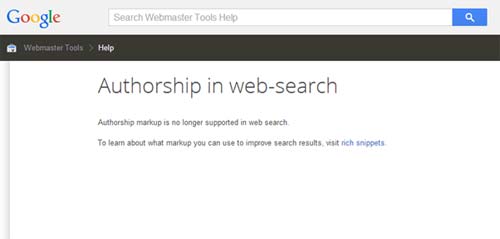So, Farewell Then, Google Authorship
So, Farewell Then, Google Authorship
Last week Google finally announced the death knell for what will now be considered an “experiment” into attributing authorship to websites in its search results. To the surprise of few in the industry, after Google hinted heavily that the project wasn’t quite as successful as they might have hoped, authorship was officially scrapped as a markup element affecting search results last Thursday when the Big G’s own John Mueller dropped the bomb on his Google Plus profile.

In a move that had looked increasingly likely ever since Google revamped their algorithm last December to dramatically reduce the number of instances of author profile headshots cropping up in search results, which was followed by their removal all together in June, the issue of authorship will no longer be troubling web developers and bloggers alike, to the considerable delight of many.

What Was The Thinking Behind Authorship?
As with most of Google’s big changes to their algorithm and the way search results are displayed, the official reasoning behind displaying authorship related to that oft quoted mantra of improving “user experience” and “quality of search results”. In exactly the same way that Google will tinker with its ranking metrics every now and again to try and prevent unscrupulous types from gaming the system, all in the name of continuing to provide the very best results, so too they decide upon implementing wholesale changes that may provide value to the average search user.
Quite whether trying to attribute a name and a face to every page of a website displayed in search results for any given query was ever truly “adding value” to search is debatable, and it’s fair to say that the passing of authorship as a search metric has hardly been met with disappointment by most in the industry, however there was some logic behind the idea. For one thing, there is a clear need to provide verification as to the credentials of anyone writing with some degree of authority on a subject. In exactly the same way that Twitter has a verification process to enable its many high profile and celebrity users to alert followers as to their genuine soapbox in a sea of copycat and parody voices, Google wanted to show it was also capable of identifying the real from the fake.
In a world where being “Internet famous” is a recognised phenomenon, where Perez Hilton is a household name in much of the tech savvy Western world and where YouTube personalities can regularly reach audiences of over 30 million (compare video game blogger PewDiePie’s 30 million+ YouTube subscribers with the 9 million who watched last week’s Great British Bake Off (source: BARB)) it’s no wonder we have such an insatiable appetite for identifying the genuine certified known name instead of being fooled by some substandard knock off fraudster. Google might argue they were just trying to help in this regard.

Did attaching authorship attribution to websites, to be displayed in search results, help boost the popularity and respect of the writers in question? Was it a nod to the increasingly hard to find pool of writers who actually knew how to write and had some understanding of their field, delivering useful and engaging content to the world? The very content that Google is constantly banging on about being king? We may never know.
So Why Have Google Binned It?
For all the positive implications of attributing authorship to a web page, there were of course numerous negative elements too. For one thing the way in which it was implemented made it complicated to get right for the non-technically gifted, and even the most seasoned of web pros frequently reported the markup to get it working properly just wouldn’t deliver as it should. The seemingly simple operation of attaching your name and your mugshot to content you’ve written on your own site turned out to be anything but.
What’s more, the whole system was open to abuse in a way Google struggled to address. In one embarrassing incident for the search giant, a recent New York Times article was attributed to Truman Capote in its search results, despite his having been dead for almost 30 years. If it couldn’t successfully identify a living author from the deceased, how was it going to sort the genuine from the jokers?
Mueller claimed in his Google+ post that the search results displayed with headshots had had little impact on click through rates when compared to those without (presumably having conducted a good bit of A/B testing - everybody’s favourite conversion rate optimisation tactic). If Google weren’t seeing it have any effect on the way users viewed search results, what was the point?
There was also a sense that users were being forced into implementing authorship attribution on their websites, despite the lack of evidence to suggest it had any real user experience benefits. In much the same way that businesses fear they have to have a presence on Google+, lest they get penalised by Google for not falling in line, the authorship experiment seemed to be a fiddly necessity for anyone who didn’t want to risk their site being ignored in search results. Surely you don’t want to be the sole site without a bit of face based credibility in the list of choices search users are presented with?
Is This An Embarrassment For Google?
You could argue that Google backtracking on itself in this manner, scrapping the scheme just three years after having introduced it, would leave it feeling rather sheepish, but in truth google have previous here. There are plenty of examples of Google killing off new initiatives and services if they don’t believe they’ve been successful enough, some missed (such as Google Buzz and Google Reader) and some less so (anyone remember Google Lively? Thought not).
In many respects it may be that Google’s ability to recognise failing ventures and knock them on the head is exactly why they’ve been so dominant for the past decade. Certainly they’d like us all to think they’re innovators so far ahead of the chasing pack that to question them would be insolent.
What Can Be Learned From This?
Although it proved to be somewhat unpopular and was perhaps poorly implemented, the authorship story has at least given credence to Google’s regular assertions that everything they do is to benefit the user, by virtue of the fact that it was a clear statement of intent in attempting to combat low quality, low authority content. It’s the same principle behind the much loathed Panda algorithm updates, which although feared by webmasters wary of losing traffic and visibility, do genuinely have a positive effect on weeding out the often automatically generated low quality tosh that can render search results less useful and relevant.
Follow my contributions to the blog to find out more about SEO and content strategy, or sign up to the ThoughtShift Guest List, our monthly email, to keep up-to-date on all our blogposts, guides and events.
